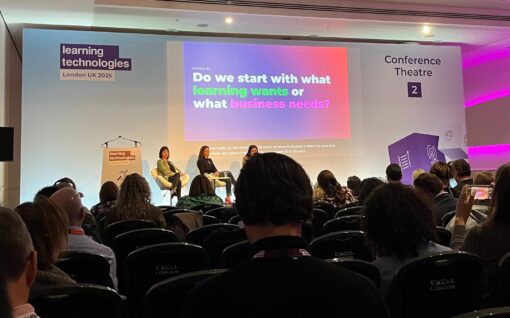Research Digested: Augmented work for an automated, AI-driven world, IBM
A snapshot of useful research for L&D and workplace professionals.
Why read this report
The report says the AI revolution has reached a tipping point and that organisations need to structure work strategically. It says organisations need to rethink all job roles and skills sets and how work gets done. It’s not good just automating activities – organisations need to change operating models so that technology is at the core.
About this research
The report builds on two new studies, one with 3,000 global C-suite leaders and one with 21,000 global workers.
Standout stats
Executives predict that 40% of the workforce will need to reskill because of AI and automation over the next three years. And they expect next-gen employees to be impacted most – 18% say it will have an extreme impact on entry level roles by 2025, 29% a significant impact and 30% a moderate impact.
More than three in four say entry-level positions are already feeling the impact, whereas 22% say it’s already impacting on executive or senior management roles.
What do those execs mean by reskilling? The majority (87%) think job roles will be augmented by generative AI, not replaced by them. The figures vary according to profession: marketing (73%), customer service (77%), procurement (97%), risk and compliance (93%) and finance (93%).
What skills are required in this changing landscape? The report says there is a pivot away from STEM skills (slipping from being the number one skill in 2016 to 12th place in 2023). Instead, execs are more interested in people skills – time management and prioritisation, collaboration and communication. The report says this is partly because tech has become much more user friendly, enabling employees to do more with less advanced tech skills. Also, as machines do the more mundane, heavy lifting work, employees are freed up to concentrate on collaborative, problem solving tasks that require stronger people skills.
Of course, L&D and HR teams have a pivotal role to play in capturing, updating and maintaining organisational skills.
IBM IBV (Institute for Business Value) research found that organisations that have focussed on reskilling to take advantage of tech-driven job changes are reaping the benefits, with an average revenue growth rate premium of 15%. And those that honed in on AI are seeing even greater results: a 36% higher rate of revenue growth.
Generative AI will reinvent the way that organisations work, according to 83% of execs surveyed in IBM IBV research in May 2023. This requires organisations to change their operating models. The survey claims that over the past three years, organisations that see the operating model as the ultimate driver of enterprise transformation are outperforming in several key areas: profitability/efficiency (55% higher performance), revenue growth/effectiveness (44% higher performance), innovation (19% higher performance) and employee engagement (33% higher performance).
Final word
AI has the potential to transform the employee experience by taking over mundane tasks. IBM says it will create exciting new job roles and career paths. But, many employees worry that AI will replace them. Employers need to reassure employees that AI will actually lead to better work outcomes for them. Employees care deeply about having meaningful work, something that AI will free them up to do. That’s why the IBM report talks about planning human-machine partnerships, enabling this meaningful work to happen.
A final couple of stats: nearly 50% of employees care more about the work that they do than about who they work for or with – 45% say impactful work is their most important work criteria, although only 23% of execs said it was the most important criteria for employees.
Report reading time: 20 minutes
Media: PDF
Link: https://www.ibm.com/thought-leadership/institute-business-value/en-us/report/augmented-workforce

